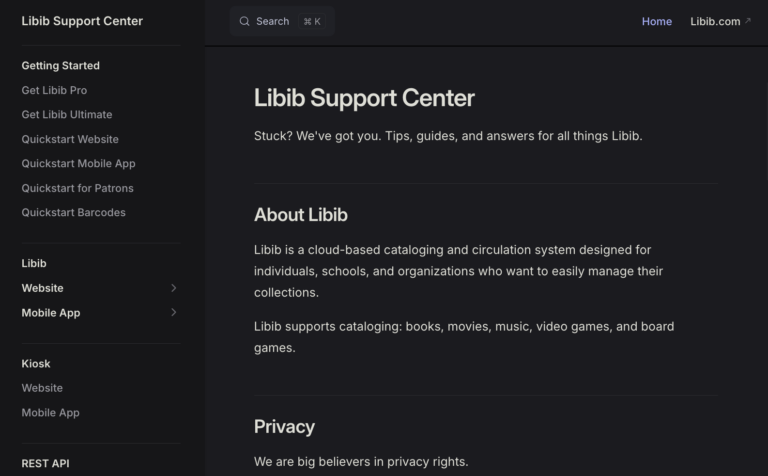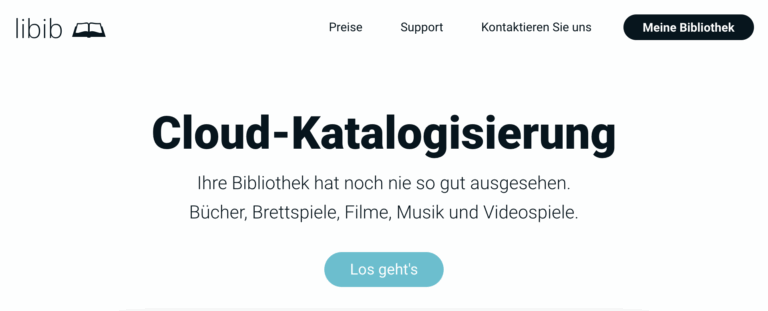Our Reason for Starting: A Personal Library Cataloging Project
Libib didn’t emerge from some grand vision to disrupt an industry or capture market share.
It started because we had a small problem that needed solving: keeping track of our personal libraries.
Like many book lovers, we’d accumulated stacks of books everywhere, but we kept losing track of what we actually owned. How many times had we bought a duplicate or wondered if we’d already lent something out? Existing solutions were either expensive enterprise software or custom spreadsheets that few wanted to maintain.
We built Libib for ourselves first. A simple, clean way to catalog our stuff (books, movies, music, video games and board games) without the bloat, without the complexity, and without anyone trying to sell our data. When we realized other people had the same problem, sharing it felt natural.
That origin story matters because it shaped everything that came after.
Eschewing Venture Capital
When we first started Libib around 2014, we spoke to a handful of VCs, and realized very quickly that what they offered was not what we wanted.
We wanted sustainable and steady growth to cover costs and make profit.
They wanted astronomical growth with no profit.
We wanted to create a calm work atmosphere.
They wanted crisis mode all hours, all days.
We wanted to respect the values of our users, particularly around privacy.
They absolutely did not want that. Every mouse click, every page element, every entrance, every exit was to be monitored, A/B tested, visualized, and manipulated.
Our decision to avoid VC funding wasn’t just financial, it was philosophical.
So we decided to give it a go on our own, with no cash infusions, but also no outside debt.
The Enshittification of Giants
By 2014, we’d already been disillusioned with the tech utopian promises.
- “Move fast and break things” was becoming synonymous with “who cares who or what we harm”.
- “Don’t be evil” was eye-roll inducing as Google sucked up the personal data of everyone it came into contact with to serve invasive ads.
- “Start a conversation” had devolved into “fight with strangers”.
DOONESBURY © G. B. Trudeau. Reprinted with permission of ANDREWS MCMEEL SYNDICATION. All rights reserved
Enshittification doesn’t just occur at the product level, it seeps into every aspect of a business. Management gets worse and narrowly focused on profit over all.
One of the ways to avoid this, is to have clear red lines, and avoid hiring people who would cross those lines.
We’re a small company, and one of the criteria we have when hiring is to only bring on people who would get the “ick” if we tried to change that.
- Decisions made to better the product get priority.
- Never collect more user info than we need to provide the service.
- Never sell or share data to 3rd parties (other than as-needed to provide the service – such as using payment gateways).
- Pricing should be 100% transparent. No guessing, no haggling, no surprise fees.
- Keep an eye on privacy regulations across the globe and always stay ahead of the curve – if we’re doing privacy right, we should never be caught off-guard.
Our Look Toward the Future: More Features and Old Internet Ideals
Ten years in, we’re still here, still independent, and still committed to those original principles. The internet has gotten more hostile, more manipulative, and more depletive, but for us it reinforces why our approach matters.
We’re not interested in pivoting to AI everything or chasing whatever buzzword VCs are throwing money at this quarter. We’re focused on making Libib better at what it does: helping people organize their collections.
Yes, that means more features, updated mobile apps, improved sharing options, enhanced cataloging tools, but it also means staying true to those old internet ideals: building useful tools for people, charging fair prices for good service, and treating users like humans rather than data points to be harvested.
Ten years of positive user response has shown us we’re not alone in wanting something better.
Here’s to the next decade of proving you can build a successful business without selling your soul, or your users’ data




